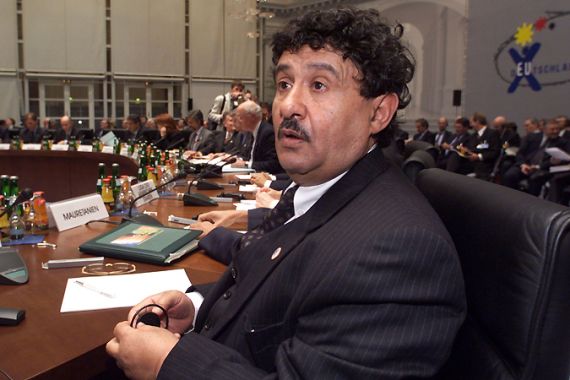Gaddafi envoy seeks Turkish truce deal
Libyan envoy meets Turkish and Maltese ministers in apparent bid to reach negotiated settlement to crisis.

| Despite Gaddafi’s public insistence on staying, in private it appears he may be open to a negotiated deal [Al Jazeera] |
The Libyan deputy foreign minister has arrived in the Turkish capital, Ankara, in a bid to help negotiate a ceasefire with opposition forces in the North African nation, a day after he visited Greece on a similar mission.
Abdel Ati al-Obeidi and his Turkish counterpart Ahmet Davutoglu were to look at common ground between forces loyal to Muammar Gaddafi, the Libyan leader, and the opposition National Council, officials said.
“We will do our best so that the suffering in Libya comes to an end in the shortest possible time and that a roadmap is outlined in a way that would include political changes in line with the demands of the Libyan people,” Davutoglu said ahead of Monday’s meeting.
After their talks, Turkey’s NTV television cited al-Obeidi as telling Davutoglu that the Libyan government wants to see a quick end to the fighting. No further details on the talks were announced.
Al-Obeidi then continued his diplomatic tour, meeting with Lawrence Gonzi, the Maltese prime minister, in Malta’s capital, Valetta. Officials remained tightlipped about what was discussed during those talks.
The meetings come a day after al-Obeidi went to Athens seeking a political settlement on the Libyan crisis, over fears of an open-ended conflict.
“The Libyan envoy wanted to convey that his country has the intention to negotiate,” a Greek official said after the visit, adding: “We don’t think that there can be a military solution to this crisis.”
Obeidi crossed into neighbouring Tunisia on Sunday and travelled from Djerba airport to the Greek capital to meet George Papandreou, the Greek prime minister, later in the day.
In a statement, the Greek foreign ministry said it was committed to seeking a “political, diplomatic solution” to the crisis in Libya, where government forces are battling pro-democracy fighters seeking to end Gaddafi’s almost 42 year-old rule.
Papandreou had been talking by telephone with officials in Tripoli as well as the leaders of Qatar, Turkey and Britain over the past two days.
Libya-Greece ties
Greece and Libya have had close ties since the 1980s.
“It stands to reason that Libya would reach out to the Greeks, if they would reach out to anyone in Europe, because Greece is a country that”s always been Arab-friendly in its foreign policy,” John Psaropoulous, editor of the Greek magazine Odyssey, told Al Jazeera.
 |
Given the poor state of the Greek economy, he added, its government is currently particularly susceptible to incentives from Libya, such as cheap oil.
While it has not participated in the air strikes, Greece has provided access to its territorial waters to French aircraft carriers southwest of Crete, along with permanent territorial access to NATO and US forces.
Anita McNaught, Al Jazeera’s correspondent in Tripoli, said there is much speculation about what might be discussed during the reported negotiations.
They could involve some of transitional arrangement to help Gaddafi “take a graceful exit from the Libyan political scene,” she said.
Greece is likely to be viewed by Tripoli as one of few potential negotiating partners in Europe, McNaught said.
“Would Libya think that Greece would be a more sympathetic ear in Europe, than old friends like Italy, which Libya feels betrayed by, and all the other implacable voices in the rest of the EU?”
Italy recognises rebels
Meanwhile in Italy, Franco Frattini, the country’s foreign minister, dismissed a message from Gaddafi’s envoy for discussions to halt fighting in Libya, saying that the request was “not credible” because it did not mention the leader standing down.
Speaking after a meeting on Monday with Ali Essawi, a member of the Libyan rebel council, Frattini said Gaddafi’s departure was a “pre-condition” to any negotiated settlement over Libya and gave his support to the country”s opposition council.
“We have decided to recognise the council as the only political, legitimate interlocutor to represent Libya,” he told reporters, in the clearest sign that Italy now backs the Transitional National Council set up in Benghazi.
“A solution for the future of Libya has a pre-condition – that Gaddafi’s regime leaves and is out and that Gaddafi himself and his family leave the country,” he said.
Italy is the third country to recognise the council, following France and Qatar.
Also on Monday, David Cameron, the British prime minister, paid a surprise visit to an Italian airbase where UK air force crews are stationed. He announced that four additional Tornado ground attack aircraft would be deployed by the UK.
“At some stage, there will have to be genuine ceasefire and then the political process can start. Until then, we have got to keep the pressure up,” Cameron told reporters.
Earlier, The New York Times reported that Saif al-Islam and Saadi Gaddafi, two of the Libyan leader’s sons, have created their own plan to remove their father from power amicably and negotiate an end to the conflict.